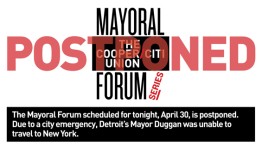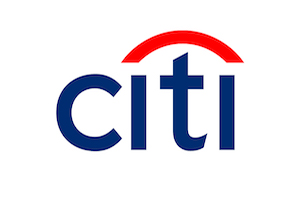POSTPONED The Cooper Union/Citi Mayoral Forum: Detroit
Tuesday, April 30, 2019, 7 - 8:30pm

POSTPONED UNTIL FURTHER NOTICE
Mike Duggan, mayor of Detroit, speaks about the revitalization of his city with Rip Rapson, president and CEO, Kresge Foundation, Maurice Cox AR'83, director of planning and development for the city of Detroit, and Juan Atkins, a Kresge artist fellow and a pioneer of Detroit techno, in a free, public event. Jennifer Bradley, Executive Director for the Center for Urban Innovation at the Aspen Institute, moderates. Atkins will also perform as part of the evening’s program. This free event is the first of The Cooper Union/Citi Mayoral Forum Series.
RSVP required. Please note seating is on a first come basis; an RSVP does not guarantee admission as we generally overbook to ensure a full house.
With declining federal resources, aging infrastructure, and shifting economies, city leaders standing at the frontlines facing our local communities are activating all available assets to find short and long-term solutions. As our cities’ mayors work to find new ways to address long-held challenges, they are seeking to catalyze the commitment and resources of many, including grassroots organizations, non-profits, private philanthropists, and corporate leaders to initiate transformational progress.
Nowhere is this more true than in Detroit, a city undergoing a near-complete metamorphosis. While other cities are experiencing industry-related growth, Detroit’s growth is unique in that the change is driven and informed by the vision of a citizen-focused, inclusive city that is responsive to new, emerging, and nascent social, political, and economic needs. Mayor Mike Duggan has been at the helm of this transformation since taking office in 2013. Duggan has formed and relied upon expansive, cross-sector public-private partnerships. For example, the City of Detroit has partnered with the Kresge Foundation to promote and expand strategic transit-oriented development to increase long-term equitable opportunity, with Quicken Loans to spur homeownership and inclusive economic growth, and with local non-profit organizations like Osborn Neighborhood Alliance for social services. And don’t forget how art and music are also integral to a city’s growth.
Michael E. "Mike" Duggan is the 75th mayor of Detroit, Michigan - elected in 2013. He received 52% of the primary vote as a write-in candidate, then 55% of the vote in the mayoral run-off in November 2013. A Democrat, Duggan was an appointed and elected official in Wayne County, Michigan beginning in 1986 as Wayne County's assistant corporation counsel. He was deputy County Executive from 1987 to 2001 under Edward H. McNamara and was elected prosecutor in 2000. Beginning in 2004, Duggan was president and CEO of the Detroit Medical Center. He resigned his position at the DMC in 2012 to run for the office of mayor. He ran for Mayor of Detroit on a platform of financial turnaround, crime reduction and economic development - believing that, "Every neighborhood has a future.”
Rip Rapson is president and CEO of The Kresge Foundation, a private, national foundation dedicated to expanding opportunities in America’s cities through grantmaking and social investing. Since his appointment in 2006, Rapson has led the 95-year-old foundation to adopt an array of grantmaking and investing tools to improve the economic, social, cultural and environmental conditions of urban life through six defined programs: arts and culture, education, environment, health, human services and community development in Kresge’s hometown of Detroit.
An 1983 alumnus of The Irwin S. Chanin School of Architecture of The Cooper Union, Maurice Cox is the director of planning and development for the City of Detroit. Cox previously served as mayor of Charlottesville, Virginia; design director of the National Endowment of the Arts; and director of the Tulane City Center in New Orleans. Early in his career, he spent a decade teaching and practicing architecture in Florence, Italy.
As an originator of techno music, Juan Atkins transformed electronic music and joined the ranks of Detroit’s musical legacy. In 1981, Atkins and Richard “3070” Davis co-founded the groundbreaking electro group Cybotron, which laid the foundation for Detroit techno. In 1985, Atkins founded his own label Metroplex Records and recorded his first single with his new group Model 500. Toward the end of the 1980s, techno music swept the planet with Atkins in high demand for live performances around the world. With the re-launch of Metroplex Records in 2011, Atkins continues to bring musical innovations to the world.
Jennifer Bradley is the founding director of the Center for Urban Innovation and the co-author, with Bruce Katz, of The Metropolitan Revolution (Brookings Press, 2013). At the Center for Urban Innovation, she has led projects on: how local-level regulations can help or hinder innovation and economic inclusion; how cities can prepare for the advent of autonomous vehicles; how inclusive innovation happens in businesses, philanthropies, local governments, and non-profits; and the challenges that women and people of color have in accessing capital.
Made possible with support from

Located in The Great Hall, in the Foundation Building, 7 East 7th Street, between Third and Fourth Avenues




